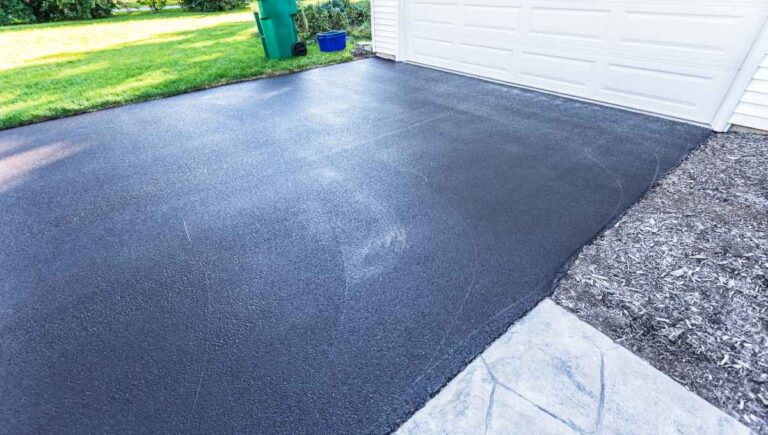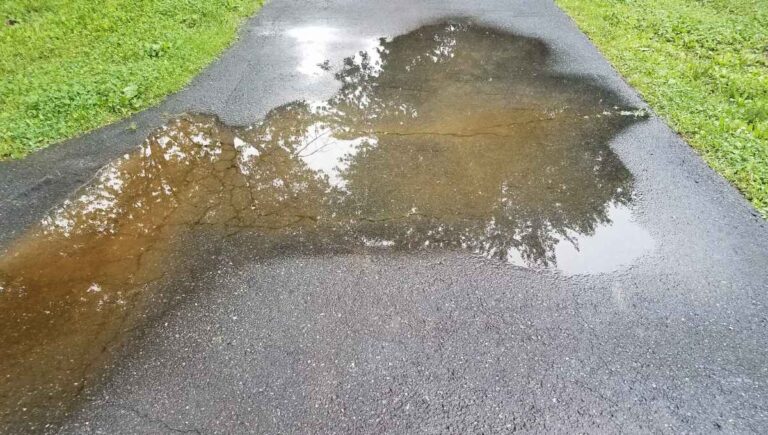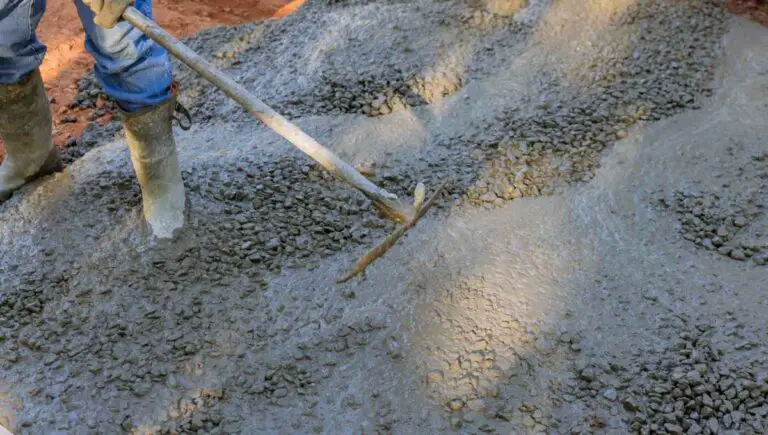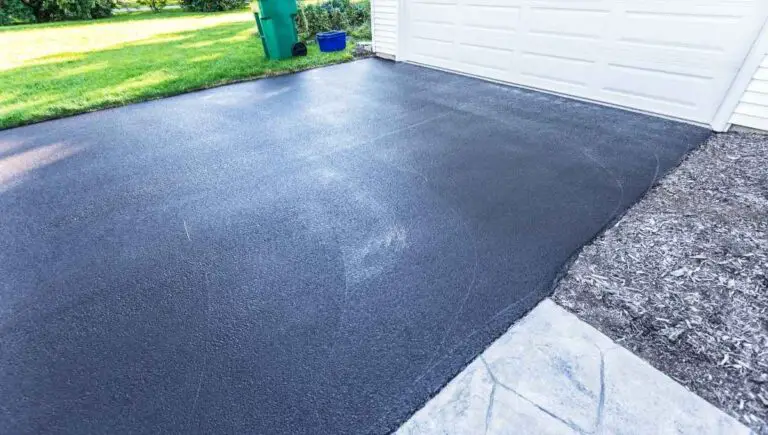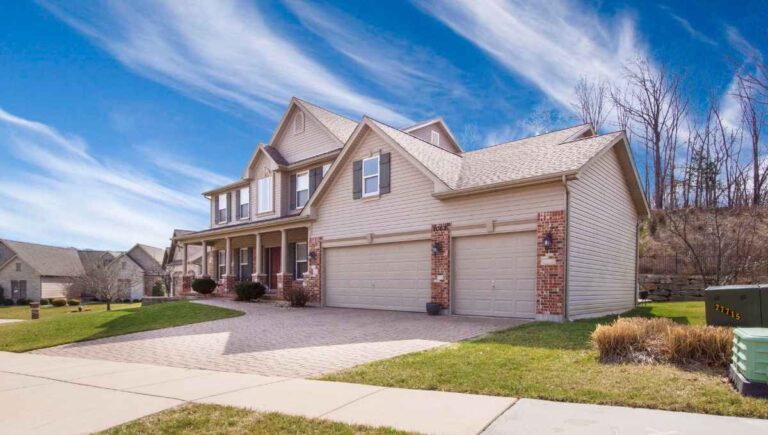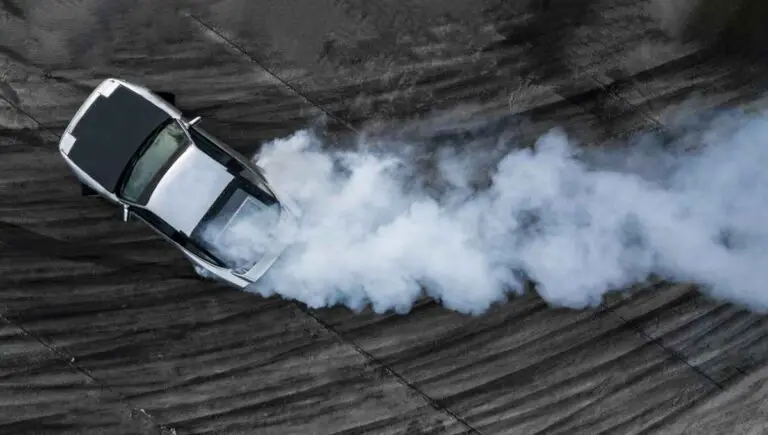Why Is My Driveway Turning Black? (Causes and Easy Fixes)
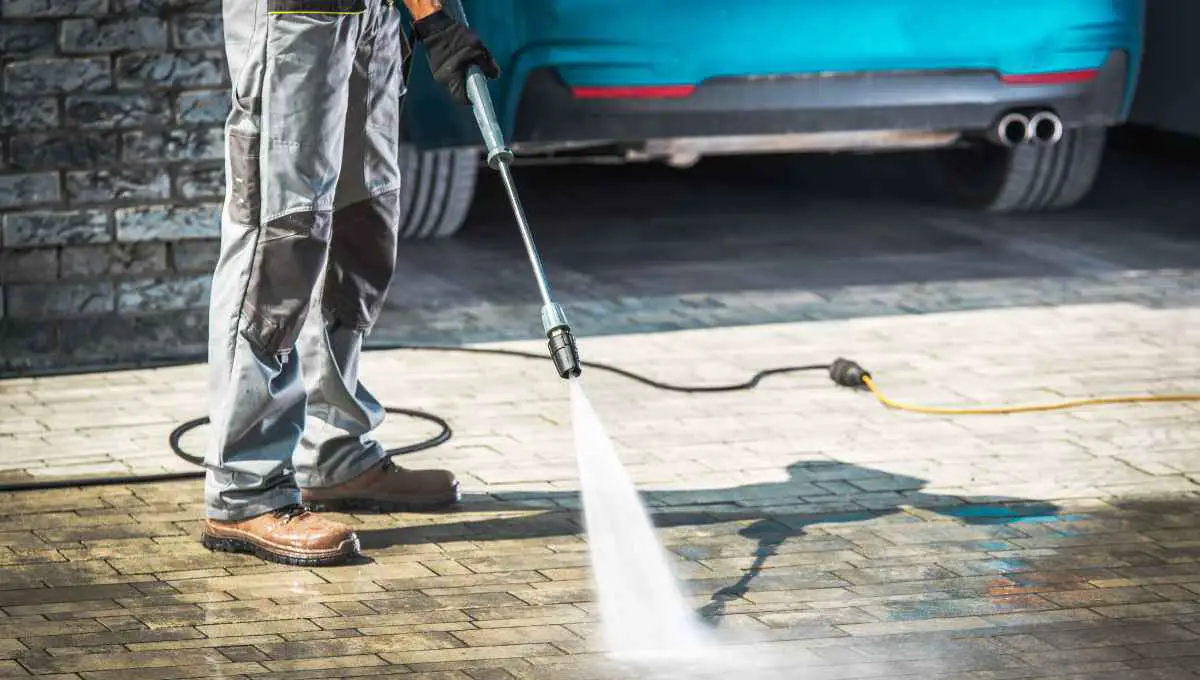
It’s one of a homeowner’s worst nightmares. One morning, you go out to get the mail and notice black spots creeping along your driveway. So, of course, you wonder, why is my driveway turning black?
Black spots on your driveway are likely early signs of mold growth. It may also show up in other colors. You need to clean your driveway as quickly as possible to stop the growth.
So, in this article, we’ll be talking about the common causes of mold growth on a driveway and get into the best ways to eliminate those gross spots. Plus, we’ll discuss how to prevent the mold from showing up in the first place!
This post contains affiliate links from Amazon and other stores. This means Yard Blogger may earn a commission if you make a purchase using any of our links. Please refer to our full affiliate disclosure policy for full details.
Here’s a Quick Pro Tip!
No one likes the idea of black spots forming on their driveway. But it happens. So, if you’re struggling to get those pesky black spots out of your otherwise pristine driveway, we can help.
We’ve put together three great products you can use on your driveway to get rid of those awful black spots and prevent them from ever coming back. Check it out:
1. Moss, Mold, Algae, and Mildew Prevention – Pre-treat your driveway to stop growth in its tracks!
2. Grass and Weed Killer – Don’t let grass pop up where it doesn’t belong.
3. Pressure Washer – Get your driveway clean and blast away those pesky roots.
Common Causes of Black Spots on a Concrete Driveway
Mold occurs on a driveway when it is not cleaned often enough. It can also form if the driveway has small divots and recesses where water and plant material can get stuck. Mold uses a variety of organic materials to feed on, and it can survive almost anywhere, including concrete.
Fun fact, you can sometimes sense mold growth before it’s visible! So if you’re noticing a bad, almost rotting smell or if your allergies are starting to act up with no apparent cause, these are other signs of mold growth, and your driveway isn’t immune.
However, there are many other reasons why your concrete is turning black. While mold is a common cause, it’s not the only one. Before you start treating your driveway for mold, check to make sure it’s not one of these other common causes.
Moisture
If you notice black spots in your concrete as it’s drying or shortly thereafter, the answer is probably that your concrete batches weren’t evenly mixed. This could be due to having too much water in specific batches.
As the concrete dries and cures, it may look different due to the excess water in certain patches. These spots aren’t drying as quickly and, therefore, look darker, possibly even black. This is often referred to as uneven curing.
Additionally, it could be that two different brands or types of cement were used in the pouring of your driveway. Whether you did this yourself (perhaps the store ran out of the type you were using? We’ve all been there!) or your contractor was trying to save time and money, it happens.
It happens. Unfortunately, it does mean that once fully cured, your concrete may be two different shades, and there’s not much you can do to fix that.
You might also enjoy our post on How To Fix a Muddy Driveway
Iron or Other Minerals
If you’ve been trying to keep your driveway clean but still notice black spots, it might be your water! Water high in iron or other minerals like calcium can sometimes cause discoloration and erosion to concrete.
Luckily, this damage is typically fixable. But if you notice your driveway turning black after you’ve rinsed it with a hose, you may want to look into your water. It might be high in unwanted iron!
Another side effect of rinsing your driveway with a hose is that you might spray dirt or plant material into the small pores of the concrete. So those black spots you see may just be dirt stuck in the concrete.
Trash and Other Stains
Sometimes, humans are the reason for your concrete to become discolored. For example, if you’re guilty of dumping out your morning coffee when you get home at night, or if your kids often spill juice or spit out gum, it can cause black spots.
Chewing gum, especially, is likely to cause black spots on a driveway. Not only is it sticky enough to get dirt and debris stuck to it, but the sugars in it can also help facilitate mold growth! So, make sure trash is being properly disposed of.
Make sure you are taking care of your driveway. Don’t dump acidic or dark liquids on it, and don’t allow people to spit out their gum on your driveway. Not only is it gross, but it’s also bad for the driveway.
Algae
While it appears similar to mold, black and other colors of algae aren’t very similar to black mold. While black mold can make you ill, algae is just another type of plant matter and is easily dealt with.
Algae grows best when the concrete’s surface is shaded most of the time. It also helps if the concrete remains damp but not saturated. These elements provide algae the nutrients it needs to grow and flourish on your concrete.
Fungi
Fungi, often lichen types, can grow on a concrete driveway when algae and plant matter are left unattended for long periods of time. Similar to algae, lichen thrives in cool, moist, shaded areas.
However, they are often even harder to get rid of because their roots dig into the concrete itself and take hold. These small organisms aren’t permanent, though, and you can get rid of them if you try.
How to Get Rid of the Black Spots on a Driveway
If you have black mold on your concrete, treating it as soon as possible is vital because it can spread very quickly. An easy way to get rid of most molds that grow on a driveway is to spray it with bleach.
However, if you’re not positive the black spots on your driveway are from mold, don’t go immediately spraying bleach everywhere! Bleach can be corrosive to concrete and stain, causing your driveway to turn different colors; this is exactly what you’re trying to avoid!
Once you’re confident you’ve identified what is causing the black spots to appear on your driveway, you’ll be able to get rid of them. The only exception to this is if the dark spots are due to issues with the concrete itself.
If there are dark spots within your concrete due to poor mixing or overwatering of the mix, there’s not much to do about it unless you’re willing to take it all out and do it again, which would be very expensive and time-consuming.
Best Ways to Kill Algae and Fungus
While fungi and algae aren’t the same, they have many similar characteristics. They both use spores to grow, and they are both killed using similar methods. You want to get to the root of the problem (pun intended.)
If you stick to the surface level and simply remove the visible spots, you’ll have a clean-looking driveway for about three days. But unfortunately, without removing the roots and spores, the algae or fungus will grow right back.
While some high-quality algae removers may work decently, it’s not the best option if you have long-term, persistent issues. However, combining these cleaners with a strong brush capable of breaking down the roots is better.
What About Water?
We’ve talked a lot about how damp spaces can create mold and a feeding ground for algae and fungi, but they can also help eliminate these pests if you use them correctly!
One of the fastest ways to deep clean your driveway, removing all the dirt and organisms growing there, is to use a pressure washer. You want to use a broad tip with at least a 15-degree angle so that you don’t accidentally cause more corrosion from the pressure!
Keep your pressure washer below 2,500 psi to ensure optimal cleaning without chipping. It’s also recommended that you keep the tip of the nozzle more than six inches away from the concrete’s surface.
You can also add certain algae killers to the water you use in your pressure washer. First, use a light spray to coat the debris, let it sit for an hour, then use a harder wash to remove the algae and fungus at the root.
The Best Cleaning and Prevention Tips
Now that we’ve gone over the fastest and easiest ways to eliminate fungus, mold, and algae, let’s talk about how to prevent them from happening in the first place!
To start with, if you are doing the work yourself to put in a concrete driveway, make sure you carefully measure out the water you’re adding to the mix. Failure to be consistent in your measuring and mixing can lead to discolored concrete, and there’s no fixing it once it’s placed!
If you’re noticing that your driveway is turning green, black, or any other funky color, it’s not supposed to be, it’s a sign of mold or algae. You can keep your concrete driveway from turning black by using a mold and algae prevention spray on it regularly.
Once discolored spots have already been established, a pressure wash and mold and mildew killer are the best way to go. The power of the pressure washer will ensure that the killer spray gets deep into the concrete to attack the root of the growth.
You may be tempted to use Clorox or another bleach on your concrete, but if you don’t dilute it correctly, the chlorine in your cleaner can cause discoloration and pitting in your concrete, which can lead to more spots for mold to take root!
Don’t Forget the Seal!
One common mistake people make that leads to the easy growth of unwanted organisms is not sealing their driveway. As a result, your driveway needs to be resealed about every three years for optimal results.
Luckily, sealing a driveway isn’t as complicated as it sounds. Most people are comfortable sealing their driveway themselves, using a commercial sealant and a roller brush. It’s very similar to painting a wall, and almost anyone can do it!
Make sure your driveway is clean and treated with weed, mold, and algae cleaner, then simply roll on your sealant to keep out unwanted pests and to keep your concrete in peak condition!
You might also enjoy our post on Can You Pave a Driveway in the Winter?
Final Thoughts
It’s possible to stop these black spots from ever forming if you take your time and mix and pour your concrete right, and use preventative measures.
However, if you didn’t mix the concrete or you’ve already noticed black spots, there’s almost always a way to fix it. Using a pressure washer or the correct chemicals can kill mold, fungus, and algae at the root, keeping them from coming back.
Hopefully, we’ve given you all the answers to your black spot questions, so you can keep your concrete driveway clean and spot-free with minimal hassle!

